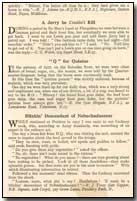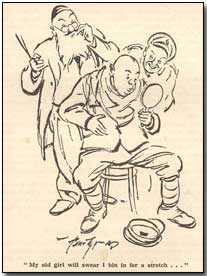Memoirs & Diaries - The Best 500 Cockney War Stories - A Jerry He Couldn't Kill and Other Stories
 Published in London
in 1921, The Best 500 Cockney War Stories
comprised, in the words of its newspaper publisher (The London Evening
News) "a remembering and retelling of those war days when laughter
sometimes saved men's reason".
Published in London
in 1921, The Best 500 Cockney War Stories
comprised, in the words of its newspaper publisher (The London Evening
News) "a remembering and retelling of those war days when laughter
sometimes saved men's reason".
The collection of short memoirs, some 500 in total, is divided into five categories - Action, Lull, Hospital, High Seas and Here and There. This page contains five stories from Lull, led by A Jerry He Couldn't Kill.
Other sections within the collection can be accessed using the sidebar to the right.
A Jerry He Couldn't Kill
During a patrol in No Man's Land at Flesquieres we were between a German patrol and their front line, but eventually we were able to get back.
I went to our Lewis gun post and told them Jerry had a patrol out. I was told:
"One German came dahn 'ere last night - full marchin' order."
"Didn't you ask him in?" I said.
"No. Told him to get out of it. You can't put a Lewis gun on one man going on leave," was the reply.
C. G. Welch, 109 Sayer Street, S.E.17
"Q" for Quinine
In the autumn of 1917, on the Salonika front, we were very often short of bread, sugar, etc., the reason, we were told by the Quartermaster-Sergeant, being that the boats were continually sunk.
At this time the "quinine parade" was strictly enforced, because of malaria, which was very prevalent.
One day we were lined up for our daily dose, which was a very strong and unpleasant one, when one of our drivers, a bit of a wag, was heard to say to the M.O.:
"Blimey! the bread boat goes dahn, the beef boat goes dahn, the rum and sugar boat goes dahn, but the perishin' quinine boat always gets 'ere."
R. Ore (100 Brigade, R.F.A.), 40 Lansdowne Road, Tottenham, N.17
Blinkin' Descendant of Nebuchadnezzar
While stationed at Pozieres in 1917 I was mate to our Cockney cook, who, according to Army standards, was something of an expert in the culinary art.
One day a brass hat from H.Q., who was visiting the unit, entered the mess to inquire about the food served to the troops.
"They 'as stew, roast, or boiled, wiv spuds and pudden to follow," said cook, bursting with pride.
"Do you give them any vegetables?" asked the officer.
"No, sir, there ain't none issued in the rations."
"No vegetables! What do you mean? - there are tons growing about here waiting to be picked. Look at all those dandelions - they make splendid greens. See that some are put in the stew tomorrow."
With which illuminating information he retired.
Followed a few moments' dead silence. Then the Cockney recovered from the shock.
"Lumme, mate, what did 'e say? Dandelions? 'E must be a blinkin' descendant of Nebuchadnezzar!"
R. J. Tiney (late Sapper, R.E. Signals, 10th Corps), 327 Green Lanes, Finsbury Park, N.
Well-Cut Tailoring
Back from a spell behind Ypres in 1915, a few of us decided to scrounge round for a hair-cut. We found a shop which we thought was a barber's, but it turned out to be a tailor's. We found out afterwards!
Still, the old Frenchman made a good job of it - just as though someone had shaved our heads.
My Cockney pal, when he discovered the truth, exclaimed: "Strike, if I go 'ome like this my old girl will swear I bin in fer a stretch."
F. G. Webb (late Cord., Middlesex Regiment), 38 Andover Road, Twickenham
Evacuating "Darby and Joan"
Things were going badly with the town of Albert, and all day the inhabitants had been streaming from the town. On horse, on foot, and in all manner of conveyances they hastened onwards...
Towards evening, when the bombardment was at its height and the roads were being plastered with shells, an old man tottered into sight pulling a crazy four-wheeled cart in which, perched amidst a pile of household goods, sat a tiny, withered lady of considerable age.
As the couple reached the point where I was standing, the old man's strength gave out and he collapsed between the shafts.
It seemed all up with them, as the guns were already registering on the only exit from the town when, thundering round a bend in the road, came a transport limber with driver and spare man.
On seeing the plight of the old people, the driver pulled up, dismounted and, together with his partner, surveyed the situation.
"What are we going to do with Darby and Joan?" asked the driver. "We can't get them and all their clobber in the limber and, if I know 'em, they won't be parted from their belongings."
"'Ook 'em on the back," replied the spare man. Sure enough, the old man was lifted into the limber and the old lady's four-wheeler tied on the back.
Off they went at the gallop, the old lady's conveyance dragging like a canoe in the wake of the Mauritania. The heroic Cockney driver, forcing his team through the din and debris of the bombardment, was now oblivious to the wails of distress; his mind was back on his duty; he had given the old people a chance of living a little longer - that was all he could do: and so he turned a deaf ear to the squeals and lamentations that each fresh jolt and swerve wrung from the terrified antiquity he was towing.
Shells dropped all around them on their career through the town until it seemed that they must "go under."
However, they appeared again and again, after each cloud cleared, and in the end I saw the little cavalcade out of the town and danger.
N. E. Crawshaw (late 15th London Regt.), 4 Mapleton Road, Southfields, S.W.18
Next - "Why 'aint the Band Playing?" and four other stories
A Runner was a soldier who carried messages by hand.
- Did you know?

